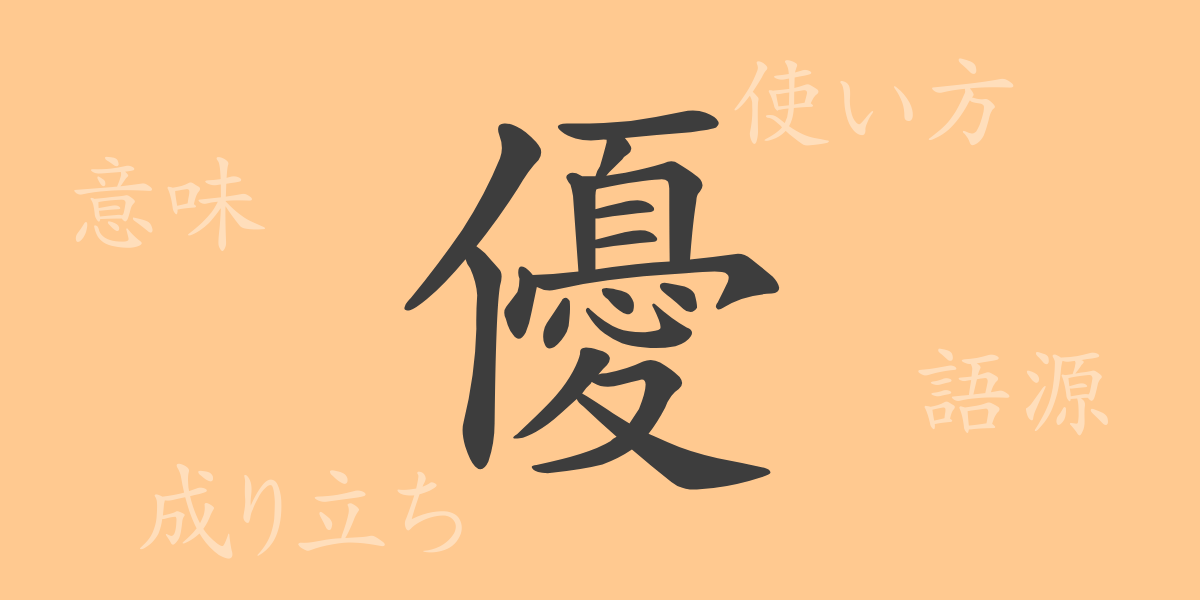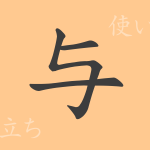The kanji (かんじ) characters in the Japanese language reflect deep history and culture through their individual meanings and forms. The character “優” (ゆう, yū) is one of the commonly used kanji in daily life, and its gentle, flowing brush strokes give a calm impression to the viewer. In this article, we will explore the rich etymology, meanings, and uses of the character “優” (ゆう, yū), as well as delve into idioms and expressions that feature this beautiful kanji, uncovering its charm in depth.
Etymology of 優 (ゆう, yū)
The kanji “優” (ゆう, yū) is believed to have originated from an ancient Chinese pictogram depicting a person bowing their head. The shape combines elements representing the head and heart, symbolizing gentleness, calmness, and consideration for others. Additionally, “優” (ゆう, yū) is a combination of the character “尤” (ゆう, yū) with the radical for “person” (人, ひと, hito). Originally, it conveyed the meaning of “plausible.” Over time, the primary meaning shifted to “excel,” and today, it is used in various contexts.
Meanings and Uses of 優 (ゆう, yū)
The kanji “優” (ゆう, yū) carries meanings such as “superior,” “kind,” and “elegant,” describing high quality, thoughtfulness, or beauty and refinement. In Japanese, it is often used as an adjectival noun in forms like “優れている” (すぐれている, sugureteiru, excelling) or “優しい” (やさしい, yasashii, kind). It is also utilized as a noun or verb in various situations. For instance, to describe a person’s character, one might say “優しい人” (やさしいひと, yasashii hito, kind person), or to denote winning a competition, the term “優勝” (ゆうしょう, yūshō) is used.
Readings, Stroke Count, and Radical of 優 (ゆう, yū)
The kanji “優” (ゆう, yū) holds a special place in the Japanese language due to its readings and structure.
- Readings: On’yomi (音読み, おんよみ) is “ユウ” (ゆう, yū), and Kun’yomi (訓読み, くんよみ) includes “やさ.しい” (やさしい, yasashii) and “すぐ.れる” (すぐれる, sugureru)
- Stroke count: 17 strokes in total
- Radical: Person (人, ひと, hito or にんべん, ninben)
Idioms, Expressions, and Proverbs Featuring 優 (ゆう, yū)
Idioms and expressions containing “優” (ゆう, yū) exemplify the breadth of its meaning. For example, “優雅” (ゆうが, yūga) signifies elegance and beauty, “優遇” (ゆうぐう, yūgū) means receiving special treatment, “優柔不断” (ゆうじゅうふだん, yūjūfudan) refers to indecisiveness, and “優に” (ゆうに, yūni) is used to mean easily. These expressions reflect the richness of the Japanese language and the diverse nuances of the character “優” (ゆう, yū).
Summary of 優 (ゆう, yū)
The kanji “優” (ゆう, yū) plays an important role in the Japanese language due to its delicate brush strokes and rich meanings. Whether expressing human emotions or discussing competitions and evaluations, this character continues to thrive beautifully and flexibly within the Japanese lexicon. We hope this article has helped you appreciate the profound world of the character “優” (ゆう, yū).

























